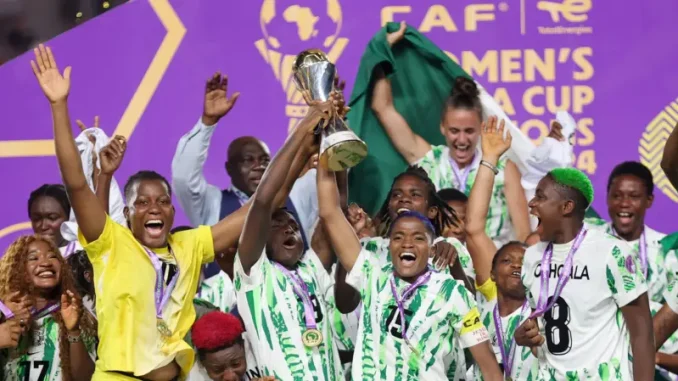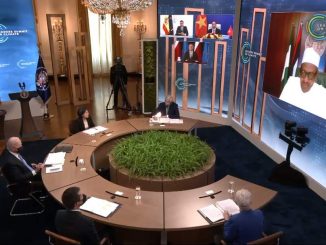
By Seyi Gesinde
July 27, 2025
In a stunning display of resilience and tactical brilliance, Nigeria’s Super Falcons overcame a daunting 2–0 deficit to topple host nation Morocco 3–2 in the final of the Women’s Africa Cup of Nations (WAFCON) at Rabat’s Olympic Stadium.
The victory secures Nigeria a record-extending 10th continental title, reinforcing their status as the queens of African women’s football.
The dramatic triumph not only underscored Nigeria’s enduring dominance in African women’s football but also demonstrated the grit, character, and tactical discipline that have come to define this latest generation of the Super Falcons.
The hosts, Morocco, had been the fairytale story of the tournament—buoyed by home support, political goodwill, and a resurgent women’s football structure. They began the final in electrifying fashion, quickly asserting dominance before a packed home crowd.
Captain Ghizlane Chebbak opened scoring in the 12th minute with a curling left-footed strike from outside the box that left Nigerian goalkeeper Chiamaka Nnadozie rooted. The stadium erupted again in the 24th minute when Sanaa Mssoudy capitalised on a defensive lapse to make it 2–0.
At that point, Morocco seemed destined to claim their maiden WAFCON title.
Trailing at the interval, Nigerian coach Justin Madugu made bold tactical adjustments and delivered what players later described as a “calm but compelling” team talk.
Madugu, who had endured heavy criticism upon his appointment in 2024, reminded his players of their mission, to win a tenth WAFCON title, dubbed internally as “Mission X.”
Reinforced by substitutions and a shift in formation that allowed Nigeria more width and fluidity, the Super Falcons re-emerged with renewed urgency.
Nigeria’s stunning comeback
The turning point arrived in the 60th minute when VAR adjudged Moroccan defender Nouhaila Benzina to have handled the ball in the box. Nigeria were awarded a penalty, which was confidently dispatched by Esther Okoronkwo, halving the deficit.
ALSO READ: How to persuade people to change their behaviour
With Moroccan nerves fraying and the stadium’s mood shifting, Nigeria capitalised. Okoronkwo again proved instrumental, threading a defence-splitting pass to Folashade Ijamilusi, who calmly slotted in the equaliser in the 71st minute.
The momentum was now firmly with Nigeria.
In the 88th minute, after sustained pressure and a series of set-pieces, a lofted delivery from a free-kick found Jennifer Echegini, whose towering header beat Moroccan goalkeeper Khadija Er-Rmichi, completing a stunning turnaround and sending the Nigerian bench into wild celebration.
As the final whistle blew, the Nigerian players collapsed in exhaustion and euphoria. Several wept openly on the pitch. Coach Madugu was hoisted onto shoulders, with chants of “Mission X achieved!” echoing around the Nigerian technical area.
Speaking post-match, Madugu said: “This is not just a football victory; it is a story of resilience, a lesson in never giving up. I dedicate this to every Nigerian girl dreaming beyond her circumstances.”
“They thought we were finished at 2–0. But we are the Super Falcons—we fight until the end.”
The Moroccan team, gallant in defeat, expressed frustration with some of the officiating. Coach Jorge Vilda, formerly of Spain’s national setup, questioned the timing and consistency of VAR interventions.
“We dominated for large periods but were let down by critical calls. That said, Nigeria were relentless, and they earned it,” Vilda conceded.
Despite the defeat, Morocco’s performance throughout the tournament has been widely praised, with many analysts noting the significance of their journey in elevating North African women’s football.
Back in Nigeria, President Bola Ahmed Tinubu announced immediate national honours for the entire squad, awarding each player the Officer of the Order of the Niger (OON), a three-bedroom flat, and ₦100 million in monetary rewards.
The announcement was met with widespread celebration across the country, with watch parties in Lagos, Abuja, and Port Harcourt erupting into street carnivals.
This victory marks Nigeria’s tenth WAFCON title in thirteen editions, cementing their legacy as the undisputed powerhouse of African women’s football.
The Super Falcons’ triumph was not merely a sporting achievement but a symbolic assertion of the strength, depth, and evolution of women’s football in Africa’s most populous nation.
As they hoisted the trophy under the lights of Rabat, one thing became clear: the Falcons may sometimes falter, but they never fall.




